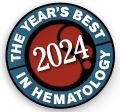T-cell immunotherapies are proving highly successful in lymphoid malignancies, with a growing range of licensed T cell-engaging bispecific antibodies and chimeric antigen receptor T-cell (CAR-T) therapies. In stark contrast, progress in myeloid blood cancers has been limited. Compounding the lack of targetable tumor cell surface antigens1 are the inflammatory tumor microenvironment and T-cell exhaustion phenotype, which both present significant challenges to translating preclinical findings into effective therapies. Two papers published this year reveal notable insights into mechanisms of T-cell exhaustion in myeloid malignancies and suggest innovative strategies to boost anti-cancer immunity.2,3
Anand S. Bhagwat, MD, PhD, and colleagues interrogated a unique resistance mechanism to CAR-T therapy in acute myeloid leukemia (AML).2 The authors were intrigued by the mismatch between the high rates of cytokine release syndrome (CRS) and the low rate of tumor response in an ongoing trial of a CD123-targeting CAR-T in adults with therapy-resistant AML (NCT03766126). In this study, only a few evaluable patients achieved a response (which was relatively short-lived, lasting two to 12 months), while more than 80% developed CRS and two patients died from CAR-T-related toxicity with grade 5 CRS. The authors hypothesized that activated CAR T cells produced CRS factors that ultimately led to increased viability of AML blasts and CAR-T dysfunction. They confirmed this hypothesis by showing that serum sampled from patients at the peak of CAR-T activity exerted a pro-survival effect on AML blasts ex vivo, while serum from patients prior to therapy did not. Myelopoietic cytokines including interleukin 3, granulocyte-macrophage colony-stimulating factor, and Fms-like tyrosine kinase 3 ligand stimulated AML blasts via janus kinase (JAK)1/2-mediated phosphorylation of STAT and downstream signaling activation. These cytokines had no direct impact on CAR T cells, but the cytokine stimulation was sufficient to promote AML resistance and, consequently, CAR-T exhaustion. Furthermore, blocking the impact of these cytokines using the JAK1/2 inhibitor ruxolitinib restored CAR-T efficacy.2 In summary, this study demonstrates that the killing of myeloblasts may in fact fuel resistance of remaining leukemic blasts — highlighting a further challenge for controlling myeloid malignancies using immunotherapies. However, it also supports existing data suggesting that ruxolitinib can reduce CRS and cytokine-mediated leukemic resistance, potentially without impairing CAR-T function.4
One month later, Tae Gun Kang, PhD, and colleagues reported that the presence of clonal hematopoiesis (CH)-associated gene mutations affecting epigenetic regulators — including TET2, DNMT3A, and ASXL1 — augment T-cell fitness by preventing terminal exhaustion.3 Previous work from this group and others has reported that disruption of DNMT3A and TET2 in CD8 T cells prevents exhaustion and improves the durability of response to CAR-T therapy.5-8 The researchers were further inspired by the observation that a subset of patients with myelodysplastic syndromes and ASXL1-mutated T cells experienced superior survival in response to anti-programmed death ligand 1 (PD-L1) immunotherapy, compared to patients with a myeloid-restricted ASXL1 mutation.9 They first tested the impact of CRISPR-mediated disruption of TET2/DNMT3A/ASXL1 in CD8 T cells in a viral model — exploring responses to lymphocytic choriomeningitis virus infection in mice after treatment with an anti-PD-L1 antibody at a time point when most T cells have undergone terminal exhaustion. Notably, only the mutated T cells were able to proliferate in response to PD-L1 blockade, and this was associated with higher expression of stem cell-like associated cell surface markers Ly108 and lower expression of exhaustion markers (T-cell immunoglobulin and mucin domain 3 and PD-1). The persistence of a stem-like T-cell population was also shown by single cell transcriptomics and trajectory analysis. To functionally validate this population, the researchers performed fate-tracking experiments that demonstrated ASXL1 knock-out T-cell progenitors gave rise to effector cells that controlled viral load. Examining differences in epigenetic states also revealed the molecular mechanisms that guide the transition from stem/progenitor to terminally differentiated T cell state. They then moved into tumor models, showing that knock-out of ASXL1 in CD8 T cells significantly improved tumor control in three syngeneic cancer models, and combination with PD-L1 treatment led to marked improvement in T-cell function.
Together, these studies provide important new insights for the future success of T cell-directed immunotherapies in myeloid malignancies. Improved knowledge of cell-intrinsic and -extrinsic vulnerabilities of cell therapies can be exploited to counteract T-cell exhaustion and the inflammatory microenvironment. Additional investigation of cell-cell interactions and contributors to cytokine-mediated therapy resistance can improve CAR-T engineering and efforts to reprogram the microenvironment. The added benefit of JAK1/2 inhibition, as suggested by Dr. Bhagwat and colleagues,2 will also require further exploration of dose-finding and timing. The use of non-specific inhibitors such as ruxolitinib may affect the regeneration of healthy, wild-type hematopoiesis, although early studies have shown mitigation of CRS without affecting the anti-tumor activity of CAR T cells. Mutations in TET2, DNMT3A, and ASXL1 are highly prevalent in individuals with myeloid malignancies. While ASXL1 is universally associated with a poor prognosis in myeloid diseases,10 the observation that ASXL1 disruption in T cells confers improved response to immune checkpoint blockade provides some optimism for the use of immunotherapies in this setting. Further studies are required to establish the proportion of patients in whom the mutations are present in the lymphoid lineage, as well as whether there are any implications for second malignancies post treatment. Moreover, these studies provide exemplars for how a “reverse translation” approach applying mechanistic biology to understanding clinical observations is critical to shedding light on new approaches to combating therapy resistance.
Disclosure Statement
Dr. Wong indicated no relevant conflicts of interest. Dr. Psaila has reported consulting activity and research funding from Alethiomics, where she is a co-founder and major shareholder. She has also received research funding from (and reported consultancy/advisory work for) Incyte, as well as reported consulting/advisory board activity and/or paid speaking engagements for GSK, Novartis, Blueprint Medicines, and Bristol Myers Squibb.

